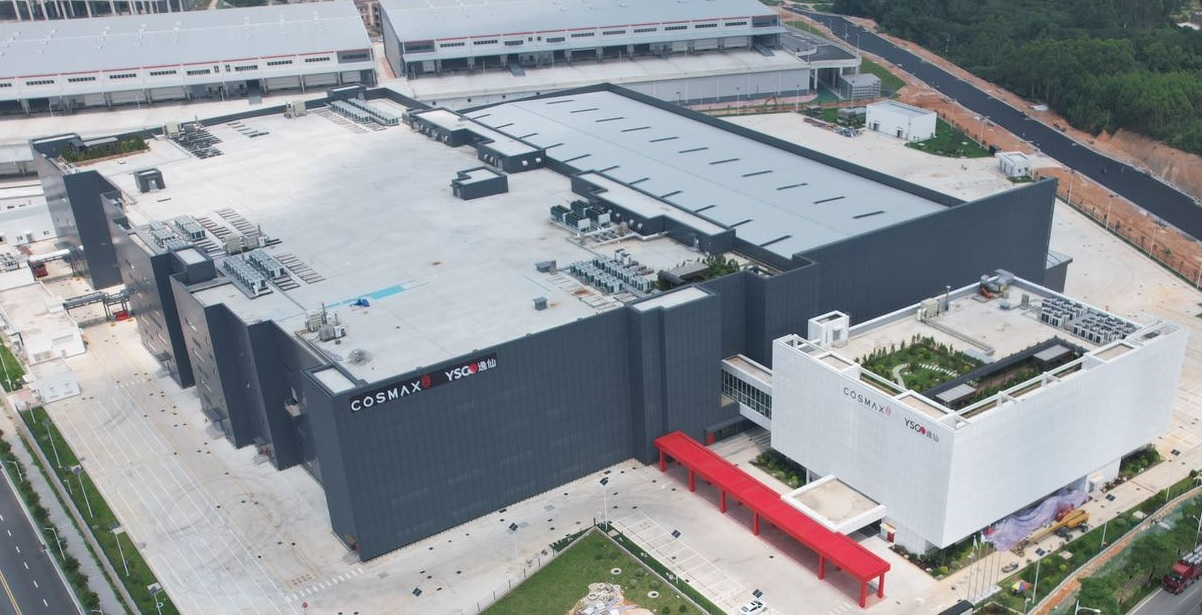 |
Cosmax's cosmetics production plant built jointly with Yatsen in Guangzhou, China (Cosmax) |
South Korean cosmetics manufacturer Cosmax BTI's cosmetics production plant, jointly built with China-based cosmetics company Yatsen, recently began operations in Guangzhou, China, amid burgeoning demand for high-quality consignment production of cosmetic goods in the Chinese market.
The plant is Asia's largest cosmetics production plant, built on 60,593 square meters of land.
According to Cosmax, the company's initial plan is to produce 5 million units of cosmetics products per month. The company said it will incrementally increase its production rate to ultimately produce 30 million units monthly, or 400 million units of cosmetics products annually.
The new plant comes as Cosmax established a 51:49 joint venture named Yatsen Biotechnology with New York-listed Chinese cosmetics company Yatsen in 2020.
Cosmax's two existing plants in Shanghai and Guangzhou had been in charge of producing cosmetic products for Yatsen. Cosmax said it plans to sequentially transfer the production process for Yatsen's supplies to its new plant in Guangzhou.
"The new plant will take the load off of existing cosmetics production plants and create additional production capacity for the two other factories in China," said a Cosmax official said via a press release. With the extra production capacity, Cosmax aims to find new customers such as Korean brands that seek Chinese expansion and widen its influence in the Chinese market, the official added.
Cosmax added that its new plant is eco-friendly, equipped with energy-saving facilities such as solar panels and purification facilities which are capable of minimizing water and air pollution created during manufacturing cosmetics products. The company said the factory is also equipped with an automated manufacturing and logistics system that allow for efficient production.
"Cosmax will take responsibility for research and development (of cosmetics products) and production (of them) to stably supply cosmetics brands with (makeup products)," said Cosmax CEO Lee Byung-man, who oversees Cosmax's Chinese business, during the completion ceremony for its new plant on Sunday.
"We will introduce products that can capture the hearts of consumers not only in China but also around the world by (aiming for) continuous innovation with Cosmax, the global No. 1 cosmetics original development manufacturing (ODM) company," Huang Jinfeng, the CEO of Yatsen Holdings, said during the ceremony.
Experts gave positive forecasts of Korean ODM companies' performance in the Chinese cosmetics market, amid exponential growth and soaring demand for high-quality products.
"The level of Chinese consumers' cosmetics consumption is emerging as the world's second-largest after the United States," said an official from the Korea Trade and Investment Promotion Agency.
"Consequently, the demand for cosmetics consignment producers has been rising with the increase in popularity of Chinese (cosmetics) brands and China's rapid development of its online retail channels," the KOTRA official said.
According to KOTRA's data, the size of the Chinese cosmetics consignment industry more than doubled from 5.4 billion won ($4 million) in 2014 to 11.4 billion won in 2022.
However, despite the burgeoning market, currently, he said the level of technology for China's cosmetics ODM industry is is low.
"In particular, most Chinese ODM companies are in the early stages in terms of acquiring high-level R&D personnel and developing new raw ingredients for its cosmetic goods," he said.
"Although Chinese cosmetics ODM companies can provide basic functions (in cosmetics products with its own raw materials), currently, core raw materials for (Chinese) cosmetics are mainly being imported from overseas (cosmetics) manufacturing companies. China's production of raw materials for cosmetics still has room for development," he added.
With more Chinese consumers consciously checking their cosmetics ingredients, the KOTRA official said the demand for high-quality raw materials from Chinese cosmetics brands was soaring. Korea, which possesses high-end production technologies for cosmetics, is expected to benefit from such a shift.
According to the official, the demand for raw cosmetics ingredients with high health functionality will continue to grow in the Chinese market, and cosmetics and ODM companies which can meet such demands will thrive.
In regard to the potential risks of Chinese consumers boycotting Korean goods amid the escalating geopolitical rivalry between the US and China, Cosmax said its ODM capabilities are "indispensable" in China's cosmetics industry and that, the company does not expect any major business risks.
"We currently do not see any resistance among Chinese consumers on the cosmetics products made in Korea. In fact, Chinese cosmetics companies very keen on our research and development results and new products," a Cosmax official said.
"When infrastructure-related problems such as cooperation between (Korean) companies making packaging products, containers and contents of cosmetics are solved, we expect K-beauty industry to thrive even more in the Chinese market," he added.






![[Today’s K-pop] Blackpink’s Jennie, Lisa invited to Coachella as solo acts](http://res.heraldm.com/phpwas/restmb_idxmake.php?idx=644&simg=/content/image/2024/11/21/20241121050099_0.jpg)
